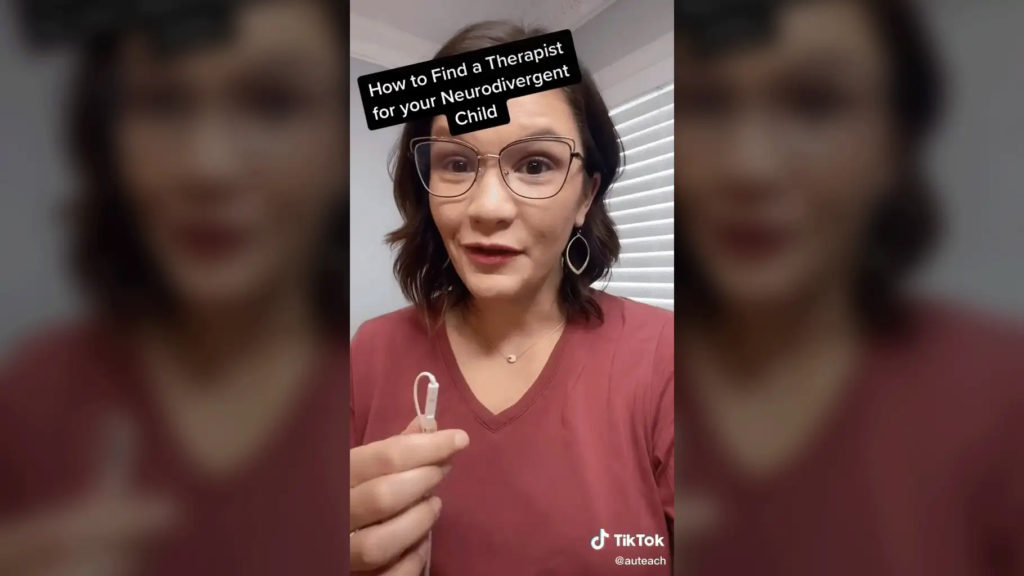Popular autistic parent and educator, AuTeach, started this series on TikTok in August 2021. I’ve compiled the 8 TikTok videos into one here to help spread her important education to broader audiences.

Choosing a pediatric therapist or service for your autistic or neurodivergent child is complicated. There is a lot of controversy surrounding Applied Behavior Analysis (ABA). Sometimes, ABA is the only resource available to families in need. AuTeach’s series is about harm reduction, focusing on these underprivileged families when you have no other choice.
Follow AuTeach on Instagram, YouTube, TikTok, or join her community!
Video Transcription
Part 1: Series Introduction & Disclaimer
Okay, so you’re a parent of a neurodivergent kid and you need to choose therapy for your child. This is a series that I’m starting on “how to find a therapist and what to look for.” As the first video in the series, this is going to be kind of a disclaimer. I’m going to talk about how to find a therapist within ABA [Applied Behavior Analysis] if you need to as well as how to look for a speech therapist, occupational therapist, etc. The series is acknowledging that, for a lot of people, we have to go through insurance to get therapy covered and so parents might have to engage with ABA.
As you also know, I’m a very vocal critic of ABA but I am a realist and this is harm reduction so I will be deleting and blocking people who come to every single post to bash parents about having to use ABA services. The purpose of this is to help parents navigate the systems that they need to with the least harm possible so if this interests you, follow along this is going to be a pretty long series.
Part 2: How do I know which therapies are right for my child?
How do I know which therapies are right for my child? Number one: there is no therapy that all autistic kids need. Autism comes with a unique set of strengths and challenges for every single person, but the first place you’re going to start is your child’s evaluations.
So if your child was assessed by a neuropsychologist, a doctor, or by the school district you’re going to have some reports to look through and you’re going to identify some things that your kids struggle with. Maybe it’s sensory regulation. Maybe it’s communication. Maybe it’s behavior. And you’re going to try and match up the type of therapy with the need, so if your child struggles with language, you’re going to seek out a speech and language pathologist. If your child struggles with sensory regulation you’re going to seek out an occupational therapist, and if your child struggles with their behavior you may be in a position where you have to seek out ABA
In the next part, we’re going to dive into what to look for.
Part 3: How do I research therapy agencies?
Okay, this is my series on how to find a therapist for your child. Before you actually start the process, one of the ways that you can research agencies is to actually sign up on Indeed or another job listing site for therapy jobs in your area. You will learn so much if you do this.
One, you want to look for who’s constantly hiring because they are either expanding or they have a really high turnover. A high turnover means your child’s case is also going to have a high turnover and you’re going to have multiple therapists.
Then look at what they’re paying compared to other agencies. The agencies that pay the least have the highest turnover and they generally have more of a factory vibe and you’re not going to get really good service. Some of the best agencies pay $25 to $50 an hour for their therapist because they’re competing for the best therapist with early intervention and that’s what they pay.
Also, look at what they’re listing as a requirement for those jobs because some have higher standards than others. You’ll learn who the desirable agencies are and who isn’t.
Part 4: How do I choose an ABA therapist for my child especially if I’m hesitant about ABA?
How do I choose an ABA therapist for my child especially if I’m hesitant about ABA? The first thing you’re going to do is you’re going to find all of the agencies in your area and you’re going to do a little bit of a deep dive on their website. This is where being part of a local parent organization is actually really helpful because you can also ask around in those groups.
So you’re going to look through the website and you’re going to be looking for words like
- play-based
- natural environment (sometimes I call it “pivotal response”)
These are all code words for a more naturalistic, play-based kind of ABA. Another green flag is if the practice actually employs speech and language pathologists and occupational therapists and that they work as a team. The really rigid ABA places really don’t play well with others and generally, you won’t see a lot of collaboration there.
Make your shortlist of places that you want to call, narrow it down to three or four, and in the next video, I’ll tell you what to say when you call.
Part 5: What to say when calling therapy agencies
Okay, we’re trying to find an ABA practice for your child (if you must) and you have your shortlist of places you think might be okay and now you have to call them. So this is what you’re gonna say when you call,
“Hello, I’m looking for an evaluation for my child. Let me tell you a little bit about my family first and then let me know if you think this is a good fit. We are not a rigid ABA house, we prefer a natural environment, play-based, child-led therapy. Is that something that your agency can accommodate or has experience with?”
Now they’re going to do one of two things here. They’re going to say, “oh yeah, we do that all the time, that’s actually how we prefer to practice,” or they’re going to try and give you the hard sell on why traditional ABA is the way to go, or talk to you like you don’t actually understand what ABA even is. So if they act confused by those words then it’s not the place for you and you’re gonna just move down your list. Next, evaluations.
Part 6: Evaluation Red Flags
So you’re trying to find an ABA therapist for your child but you’re not a huge fan of ABA and now you have narrowed it down to one practice and your evaluation is scheduled.
If at all possible you’re going to want to have them conduct the evaluation in your home and not do drop off. At this point, you don’t know them. You don’t know how they practice and I would not be comfortable dropping my child off in the center and not watching the evaluation. Pay attention to things like hand over hand in the evaluation and other types of forced compliance.
You’re going to get the evaluation back and you’re going to look for some of these things.
- You want to see that they really get your child, so when you read the evaluation, does it sound like something you could write yourself?
- Are they seeing their behavior as communication?
- Are they understanding their sensory needs?
or is the entire report just the word “non-compliance” about 47 times? You can get another evaluation if this one isn’t to your liking. And follow for more.
Part 7: Reading through evaluations and what good goals look like
This is part of my series on how to find a therapist, particularly an ABA therapist (if you must) and now we’re talking about reading through evaluations and what good goals look like. When you’re looking through the goals you actually have a ton of control at this point and good goals make good therapy.
So you’re going to be looking for a lot of goals that are focused on teaching functional skills and communication. The goal should look like it’s teaching, not that it’s testing or punishing. For example, testing someone on whether they can do something over and over and over again is not actually teaching. You’re going to want to see how they are actually going to teach the skill.
You also want to look that the goals are actually in service of your child and not in service of others around them or appearances. So if a lot of the goals have the words “socially appropriate” but we haven’t yet mastered how to ask to go to the bathroom or ask for food, then they’re prioritizing other people over your child. Follow for more.
Part 8: How to talk and collaborate with the therapist on goals
So this is another part of my series on how to find a therapist, an ABA therapist if you must. So you’ve gotten the goals, you’ve looked through them, you’ve red-flagged a couple of them, and now you’re going to call a meeting with them and say,
“I’d like to proceed but I have some reservations about these goals, and I’d like to meet as a team and see if there are alternate ways that we can meet my child’s needs”
[If] the goals aren’t detailed enough, you may want to ask them to see the programs which are what the therapists get to implement the teaching. So it will have a step-by-step [of] what they say, what they do, and you’re going to want to read through those too.
Some places have like a [website] where you log in and you can see it all on a computer, and some places still use paper. You’re going to comb through that and then come up with some ideas with your team, and if they’re not open to revising at this stage then it’s not going to be a good fit and you should move on.
Your insurance is going to be paying them a lot of money and so you should be happy with the type of therapy you’re getting.
So once all the goals and programs are fine we’re going to talk about what happens when therapy actually starts.
